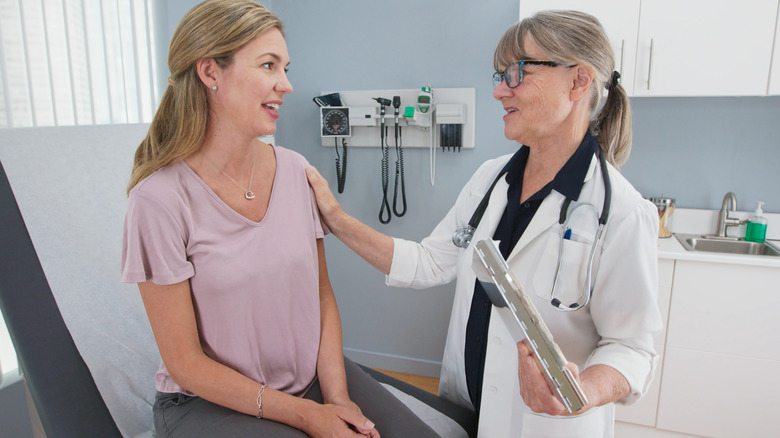When To See A Doctor About Your Period Blood Clots
Period blood clots are small lumps of coagulated blood and tissue that pass through the uterus during your menstrual cycle. According to Medical News Today, blood clots are a natural and normal part of menstruation and are formed when the uterine lining sheds and pools in the bottom of the uterus, coagulating and turning into a thick, gel-like blob. Like most blood clots, period blood clots form to help prevent you from losing too much blood.
"Blood clots are supposed to happen to some degree, like when you cut yourself," obstetrician-gynecologist Dr. Salena Zanotti told the Cleveland Clinic. "But with period clots, what happens is if you're having a good amount of bleeding, it collects inside your uterus and as it sits there it will make a clot."
Period clots can vary in size and color depending on the person and when they form. Generally speaking, period blood clots are often bright red at the very beginning and end of your period, and may appear more dark red or maroon on the days when your flow is at its heaviest.
Talk to a doctor if your period blood clots are larger than a quarter
While period blood clots are a completely normal part of menstruation, they should be relatively small in size. If your period clots are the size of a quarter or larger, you should talk to a doctor.
"If someone is passing quarter-size clots, that tells me that there could be something wrong [in] the uterus that needs further investigation," Dr. G. Thomas Ruiz, an obstetrician-gynecologist at MemorialCare Orange Coast Medical Center in Fountain Valley, California, told Self.
Large period clots can be a sign of very heavy bleeding, or menorrhagia, which can cause you to soak through at least one tampon or pad per hour for several hours in a row, and may even lead to anemia. Passing large period blood clots may also be a symptom of an underlying health condition, like endometriosis, fibroids, polycystic ovary syndrome (PCOS), adenomyosis, miscarriage, hypothyroidism, or uterine cancer.
Either way, it's important to talk to your doctor and address any concerns you may have early on, rather than later.


